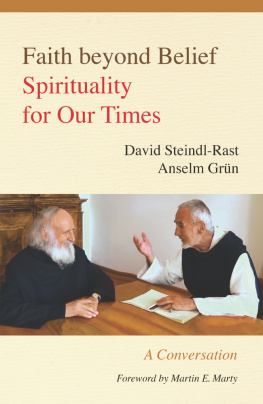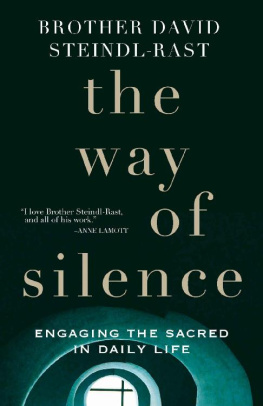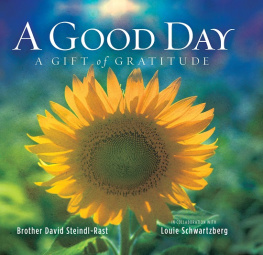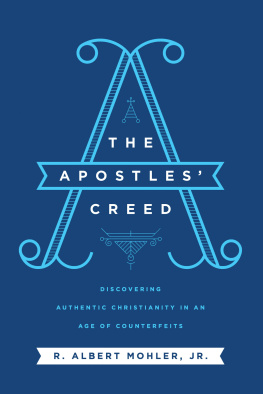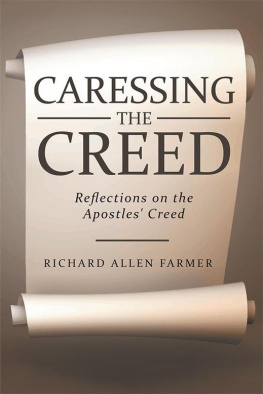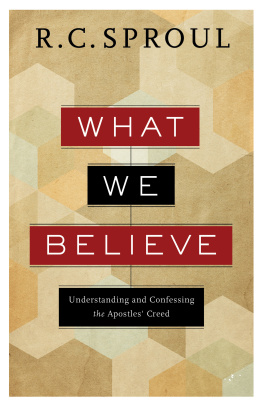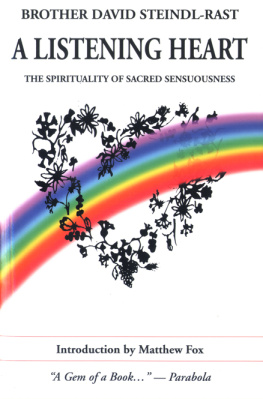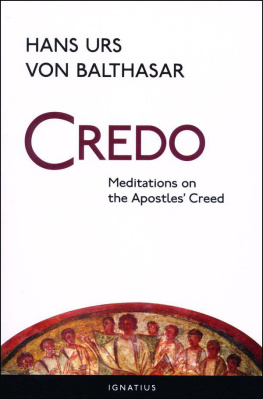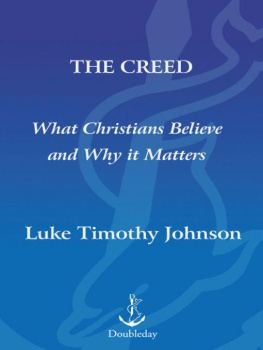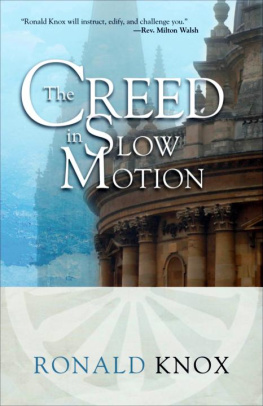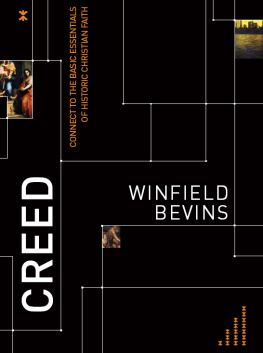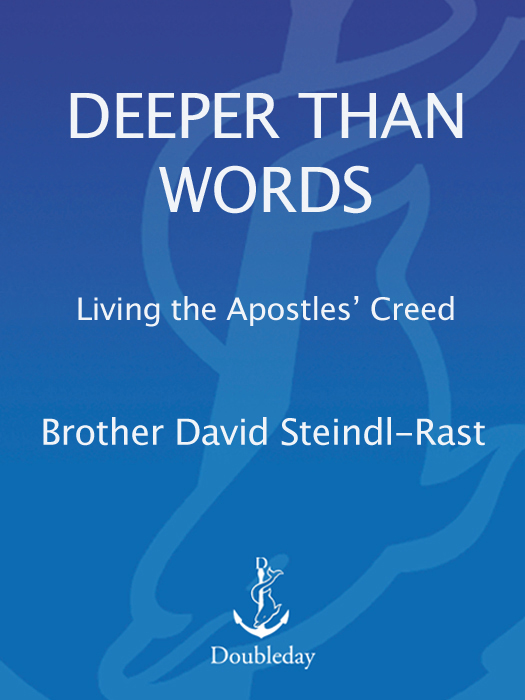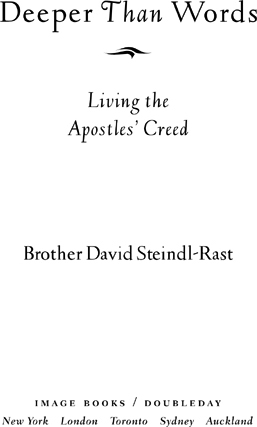PRAISE FOR
Deeper Than Words
Beautiful and profound. With mystic vision and poetic clarity, Brother David opens us to the eternal vision behind the creed.
Jack Kornfield, author of The Wise Heart: A Guide to the Universal Teachings of Buddhist Psychology
There is only one Brother David! To be in his presence is to know the possibility of walking faithfully on one chosen path, while not only respecting other faiths, but also studying them rigorously and experiencing them joyfully. In Deeper Than Words, he distills a lifetime of insight into an inspiring book that can enlighten all of us to the universal similarities and the noble particularities of the worlds wisdom traditions.
Elizabeth Lesser, cofounder of Omega Institute and author of The Seekers Guide and Broken Open: How Difficult Times Can Help Us Grow
A stunning analysis. It may not make a believer out of you but it will show you the depth of meaning of the Apostles Creed.
Sam Keen, author of In the Absence of God: Dwelling in the Presence of the Sacred
Faith is a journey of exhausting proportions that goes beyond the memorization of simple catechetics to the most profound of spiritual possibilities. It is that kind of faith of which this profoundly honest book speaks, a faith that lifts us all above the parochial and the sectarian to the spiritual heights at which we are all, indeed, One.
Sister Joan Chittister, OSB, author of The Gift of Years
This book is dedicated to you, my sisters and brothers, who used to recite the Creed
but can no longer do so with honesty and conviction.
May it help you find new meaning in the words anddeeper than words that dividethe faith that unites all human beings.

With profound gratefulness,
I acknowledge the help of countless kind people (far too many to list by name) who have made it possible to conceive, to write, and to produce this book and to put it into your, the readers, handsand to you, the reader, for your interest.
Contents
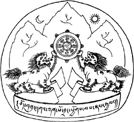
Foreword by His Holiness the Dalai Lama
Wherever we live and whatever faith we uphold or none, we share the desire to live life to its fullest, to better ourselves and the lives of our loved ones. And wherever they originally arose, all the worlds major religious traditions are similar in having the potential to help human beings live at peace with one another, with themselves, and with our natural environment.
I first really became aware that discussion between sincere practitioners of Christianity and Buddhism could be mutually enriching and spiritually sustaining for both parties when Thomas Merton came to see me many years ago. The courage he showed in exploring faith traditions beyond his own so that he could, as it were, taste the actual flavor of the teachings that other traditions represent opened my eyes. It was a source of real inspiration. Since then I have been fortunate to befriend other individuals whose joyful experience of faith in their own spiritual lives has helped them appreciate the value of other traditions, rather than the exclusive preciousness of their own. I have had the privilege not only of talking to these exhilarating men and women, but also of sharing their prayers and practice. Prominent among them is Brother David Steindl-Rast, known to many simply as Brother David, a seasoned Benedictine monk and veteran of active interreligious dialogue.
Therefore, it is a great personal pleasure to me to see this new book of Brother Davids, a book that he and I talked about, reach the light of day. In it he explores how the Christian belief in Creation and the Buddhist understanding of Interdependent Arising are two different pointers toward the same experience. He demonstrates how it may be possible for someone to remain perfectly faithful to a Christian and Western monastic commitment and yet be enriched by, say, Buddhist understanding and experience. Of course, the same is true from the Buddhist side as well. Indeed, the essence of genuine interreligious dialogue must be founded on such a conviction.
The kind of courage I mentioned above is present again here in that Brother David has chosen as his text the Apostles Creed, a fundamental expression of Christian faith. He approaches it by asking point by point, what does this mean? How do we know? And why is it important? The openhearted candor of his answers to these questions, reaching into his own living and contemporary experience, is what gives his words value and power. Brother David places great store by the marvelous unifying idea of gratefulness. Gratefulness for the kindness of the Creator and Creation resonates clearly with gratefulness for the kindness of the Buddha and all sentient beings. To nurture gratefulness in our hearts is to nurture a positive mind. And a positive mind is something that ultimately brings us benefit or happiness. I am sure many readers will join me in feeling grateful to Brother David for his kindness in writing this book.

February 2010
Introduction
God Isnt Someone Else
Imagine a monastery perched on a high cliff overlooking the Danube River in Austria. Benedictine monks have worked and prayed in this place for nine hundred years without interruption. His Holiness the Dalai Lama spent three days here, joining us Benedictines simply as a monk among monks. He worshipped with us in the chapel at the hours of prayer and ate with us in the monastic refectory. It was during one of those meals that he turned to me and said somewhat abruptly, We have so much in common, you and I, but one thing separates us: the idea of a divine Creator. This was a challenge, though not at all in the sense of a defiant confrontation. The Dalai Lamas voice expressed a genuine sadness over perceived disagreement, a pain that challenged my compassion. Four decades of participating in Buddhist/Christian dialogues had prepared me for all that came into focus at that moment. It was a challenge, I had to rise to it, and I did.
Dont ask me how. Firemen make split-second decisions at a crucial moment, rescue a life, and are unable afterward to tell how they did it. In a kind of improvised elevator speech, I had to do two things at once: stay true to my Christian traditions belief in Divine Creation and show that it was compatible with Buddhist belief in Interdependent Arising. It all hinged on bridging the gap between Creator and creation, a gap that is merely speculative and not grounded in experience. After all, the late Thomas Merton, Trappist monk and friend of both the Dalai Lama and myself, had been able to crystallize the key insight into a four-word sentence: God isnt someone else. For the mystic there is no gap between Creator and creation. The whole universe is an expression of divine life. The cosmic web of mutually interdependent cause and effect in which all things arise is what the mystic poet Kabir sees as the Secret One slowly growing a body.


